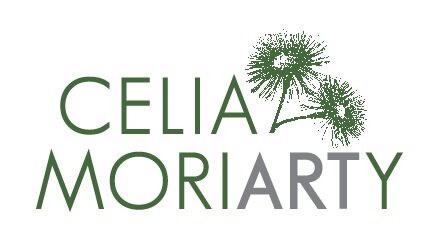Den Fisher
The project started with Den. When chatting about the scared lotus at the gardens I said “I paint Australian natives” and Den said “Paint me”. I did not paint people at that time and was embarrassed by the language faux pas. But then events overtook me and this project was on.
Den leads Aboriginal Heritage Tours at the Melbourne Botanic Gardens. He teaches visitors about Aboriginal Heritage, Culture and Connection to the land. As a spiritual man Den shows us a different way of thinking about land and it's role in our lives. He feels that the spirits gave him this work teaching about Aboriginal Culture and his work at Radio 3KND Kool n Deadly to help young people, and to restore respect for women. He couldn't ask for more.
Why not take a tour at your Botanic Gardens to learn more about our nations heritage? Learning just a little bit more is what will help us step closer to a stronger nation. Most large gardens have tours or self guided walks.
Keys To Our Country
People have keys to their house and keys to their car so that no one can take them.
The Land is my key. The key to my identity; key to my language; key to my culture and the key to my heart.
This key was taken. I work each day to restore that connection to the land and help others understand that the land is the source of who I am.
Aboriginal people don't lock away what they have because it belongs to everyone. Our way is to welcome everyone and work together.
I grew up in Queensland on an Aboriginal settlement. It was good as a child – it was great in fact – and we always had lots of games to play. You don’t understand as a child the way your people are treated.
As I grew up, I came to realise everything on the settlement was forced – we weren’t allowed to speak our native dialects and we were on rations from the government. On the settlement, we starved a lot, and we didn’t have work. Our rights were taken away from us. When the white men returned from war, they took all the jobs in manual labour that my people had been employed in.
I remember hearing from older people that white people thought it was dangerous to educate Aborigines, so when I grew up I wasn’t very educated and couldn’t read and write properly. I was born in 1957, and Aborigines weren’t even classed as Australian citizens until 1967. So for the first 10 years of my life, I wasn’t even classified as a real Australian.
I ran away from the settlement when I was 13 and a half. I got jobs in labouring, on the railways and ringbarking. I kept returning to the settlement until my mother died, and then I moved away from Queensland for good.
I moved to Sydney first and went to the Aboriginal TAFE and studied the basics in grammar and history. I didn’t know much about Australian history. One day they showed us clips and slides and I became angry about the way our people were treated and it made me hate white people. But then I couldn’t hate white people because a lot of the teachers were white, so I couldn’t blame them all.
People tell us to move on. If you’re going to tell Aborigines to move on, tell the veterans to not march on Anzac Day, tell the Jews to forgive Germans, and tell people who have lost their homes to floods and fires to forget about it. You don’t know until it happens to you. I can forgive, but I will never forget.
When I came to Melbourne, I was working voluntarily for a conservation group. I met a friend making songlines – Aboriginal music. He told me he was starting up a radio station – 3KND – and asked me to join. It’s our ninth year coming up, and it’s one of the best things I’ve ever done. My show, Mixing It In, has healed me inside and out. I choose the songs; the voice is a powerful thing. It took me two years to get my pain and suffering out. I still see it happening today with my people. It doesn’t matter what colour a person is – we can’t help a person until we are ourselves healed.
I joined Port Phillip Citizens for Reconciliation 12 years ago. I believe before Aboriginal people can reconcile with white people, we need to reconcile our own people first.
I’m also a poet, and go by the name Den the Fish. I call myself a no-hoper. “No” for violence against women, children, the elderly and people with disabilities. “Hoper” that we can one day all sit around a big fire and have a laugh, have a drink, have a cry, and move together as one.



